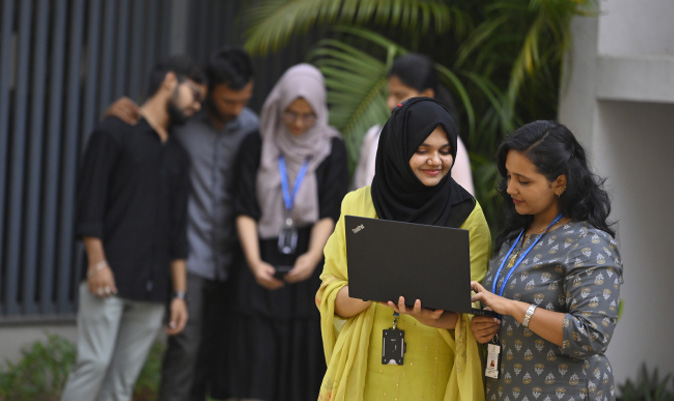M.Sc. Food Technology
Exit in 2-years with M.Sc. Food Technology
Programme Introduction
The M.Sc. in Food Technology is a postgraduate programme designed to provide students with advanced knowledge and skills in the science and technology of food production. It covers key areas such as food processing, preservation, quality control, and product development, alongside the latest advancements in food safety, sustainability, and innovation. With a strong emphasis on both theoretical foundations and practical application, the programme prepares graduates for careers in the food industry, research, and academia, equipping them to address global challenges in food security, health, and environmental sustainability. The three formats help the students to choose their career paths as per their interest.

Programme Objectives
-
• In-depth knowledge of Food Science: Provide a strong foundation in food chemistry, microbiology, and processing technologies.
-
• Mastery of Food Processing Techniques: Equip students with skills in modern food processing methods and equipment.
-
• Food Safety and Quality Assurance: Emphasize safety standards, regulatory compliance, and quality control in food production.
-
• Innovation in Product Development: Encourage creativity in developing new food products that meet consumer needs and market trends.
-
• Research and Problem Solving: Foster analytical thinking and research skills to address real- world challenges in the food industry.
-
• Industry Readiness: Blend theory with practical training to prepare students for leadership roles in food tech and related sectors.
Programme USP
The M.Sc. in Food Technology stands out for its comprehensive curriculum that combines cutting-edge food science, innovative processing techniques, and a strong emphasis on sustainability and food safety. The programme offers hands-on learning through practical components and exposure to real-world challenges through internship. With a focus on the latest technological advancements and global food trends, it equips graduates with the practical skills and knowledge needed to drive innovation and address critical issues in the food industry, making them highly competitive in the job market.
Eligibility
- Candidates who have passed the B.Sc. degree examination in Food Technology / Food Science and Nutrition / Home Science / Chemistry / Bioscience / Microbiology / Biochemistry / Biotechnology or three year Bachelor of Vocational Degree Courses (B.Voc.) in Food Processing and Engineering/ Food Processing and Quality Management / Food Science and Quality Control / Food Processing and Management / Food Processing Technology / Food Processing and Post-harvest Technology / Processing and Food Engineering / Food Processing and Preservation of any University recognized by University Grant Commission (UGC) considered as equivalent there to with a minimum of 45% (40% for SC / ST / Category-I candidates) marks in the subject excluding the marks in languages are eligible for the programme. The postgraduate programme is offered in full-time mode.
Programme Outcomes (PO)

- Advanced Knowledge:To equip students with advanced knowledge and understanding of the fundamental principles and concepts of food science, technology, and engineering. This includes in-depth knowledge of food chemistry, microbiology, processing techniques, preservation methods, quality control, sensory evaluation, and food safety regulations.
- Specialization:To offer students the opportunity to specialize in specific areas of food technology according to their interests and career goals. Specializations may include food product development, food engineering, food packaging, food quality management, or food safety and regulatory compliance.
- Practical Skills:To develop practical skills in food processing, analysis, laboratory techniques, sensory evaluation, and quality assurance. Students will gain hands-on experience using food processing equipment, analyzing food samples, conducting sensory tests, and implementing quality control measures.
- Research Abilities:To enhance students' research abilities and critical thinking skills through the completion of a thesis or research project. This outcome aims to develop students' capacity to undertake independent research, analyze data, interpret results, and contribute to the advancement of knowledge in specific areas of food technology.
- Industry Relevance:To ensure that students are equipped with the necessary skills and knowledge relevant to the food industry. This includes providing practical insights into current industry practices, emerging trends, and challenges, enabling students to address real-world problems and contribute to innovative solutions.
- Professionalism and Ethics:To instill professionalism, ethical conduct, and responsible practices in the field of food technology. Students will be encouraged to understand and adhere to ethical standards, sustainability principles, and legal regulations governing food production, safety, and labeling.
- Communication and Collaboration:To develop effective communication and collaboration skills necessary for working in multidisciplinary teams. This outcome aims to enhance students' abilities to communicate scientific information, present research findings, and collaborate with industry professionals, stakeholders, and consumers.
- Career Readiness:To prepare students for successful careers in the food industry and related sectors. This includes equipping students with the necessary skills, knowledge, and practical experience to excel in roles such as food technologists, quality control specialists, research scientists, product development managers, food safety consultants, or academia.
Career Outcome
- Academia
- Food/ Nutraceutical industries
- Research organizations/ labs
- Food Scientist
- Food Technologist
- Food Safety Officer
- Product Development Specialist
- Entrepreneur
- Food Inspector

















